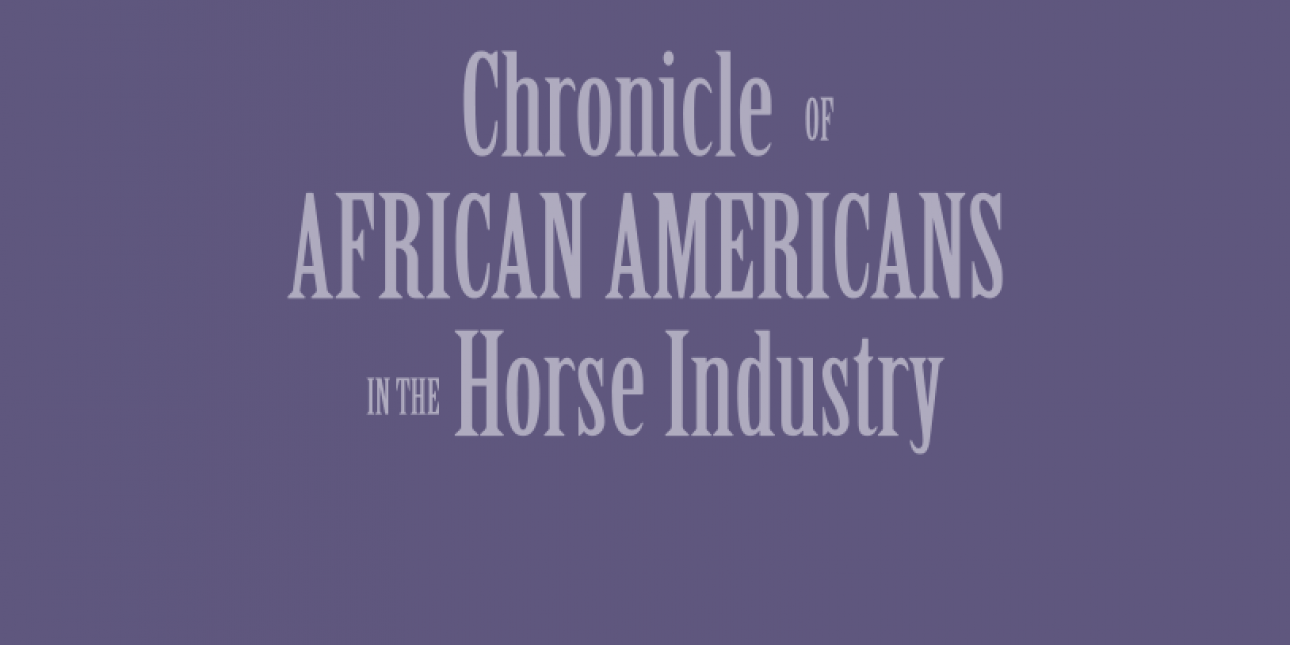About CAAHI Project

Project Background
The Chronicle of African Americans in the Horse Industry is a project of the International Museum of the Horse. The Institute for Museum and Library Services, Museums for America grant and the Kentucky Horse Park Foundation provided initial funding to create the website. The site builds on information discovered for the museum’s permanent exhibit, Black Horsemen of the Kentucky Turf.
The complete history of African Americans in the horse industry is much larger and more significant than the previous scholarship shows. The museum developed a long-term, on-site exhibition to explore this topic on a local level. It attempts to give proper acknowledgment to those who worked to create an industry that is central to the regional and state economies. Exhibition researchers learned of hundreds of African Americans working in the horse industry in Kentucky in the 19th and early 20th centuries. Many more names will emerge through continued research and community crowdsourcing efforts.
Learn more about the project’s backstory on the blog.
Website Purpose and Relevance
The museum acknowledges that diverse stories are missing from the broader narrative of American history and from the museum visitor’s experience.
The history of the horse industry in America is inseparable from African American history. It is integral to the history of America and the struggle for equality that continues today.
From agriculture to professional sports, white people built the entire equine industry on African Americans' backs. Recognition of individuals and their contributions and achievements is long overdue.
This website's research corrects a biased and incomplete narrative. It uncovers a rich history that our country has forgotten or ignored. And yet, local African American communities remember.
Popular media often misrepresents and marginalizes African Americans. It gives the appearance that African Americans in the industry are the exception, not the rule. It seems their stories are odd and unusual rather than many, varied, worthy and common.
This website is an effort to address and mitigate this disparity. The Chronicle highlights the important roles of African Americans in the horse industry through:
-
an interactive online archive, and
-
exhibition and educational components.
Such a focused and comprehensive archive does not exist online or elsewhere.
The goals of this website are that:
-
scholars,
-
students,
-
African American descendants, and
-
African Americans currently working in the horse industry,
are able to:
-
explore,
-
share,
-
contribute, and
-
engage in dialogue
by digitizing and discussing evidence related to African Americans in the horse industry.
We seek ways to:
-
involve the community in critical thinking about the context of this content and
-
teach users how to draw conclusions and connect the past to the present.
Community of Collaboration
To build a shared understanding of the African American experience, this website relies on
-
storytellers,
-
memory holders, and
-
first-hand experiencers.
Please participate in sharing pieces of the story that you may hold.
Partnerships and collaborative programming are essential to the goals of this website, as well as the museum’s mission.
The museum consults a wide range of advisors and models of community collaboration to understand the best practices in digital history.
The museum works with African American community members and follows their guidance on how to:
-
collect,
-
present, and
-
interpret cultural and individual legacies.
In recruitment efforts for staff, advisors and consultants, the museum leadership seeks out people of color to join the team.
The Louie B. Nunn Center for Oral History at the University of Kentucky guides the museum's practices in oral history collection.
Read more about specific examples of collaboration with:
-
researchers,
-
focus groups,
-
history harvests,
-
oral history recording,
-
user testing,
-
internships, and
Presentation of Materials
An organizing principle for this website is to present these fragments of American life within a fuller historical context. One way is through connecting people to the eras they’ve lived through. Another is through interpretive stories organized by theme.
The museum intends for this platform to empower and enable the African American community to share their own history. All may learn from their experiences.
Racism and discrimination come to light, as well as themes of:
-
dedication,
-
determination,
-
self-reliance, and
-
strong family bonds.
Individual voices reveal common humanity, and stereotypes dissolve.
Historical Ethics
The International Museum of the Horse supports the global movement to make the museum field more equitable. The museum strives to serve as an inclusive and compassionate space to explore the relationships between humans and horses throughout time. The museum is critiquing its own work. It aims to broaden the diversity and deepen the stories it tells and experiences it offers.
Ethical decisions are guided by international leaders in museum field best practices. This includes:
-
guidance from Smithsonian Affiliations,
-
American Association for State and Local History, and
-
the American Alliance of Museums code of ethics.
The IMH aims for transparency in the development of this website. To learn about the project team, including:
-
staff,
-
partners,
-
educators,
-
advisors,
-
contributors, and
-
authors,
visit the other pages linked to About.
Do you have an interest in working with the museum, or any questions or concerns about the project’s ethics? Please contact us at ChronicleInfo@ky.gov.